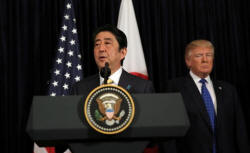|
Japan's Abe: Trump shares
view that monetary policy not forex manipulation
 Send a link to a friend
Send a link to a friend
 [February 15, 2017]
By Stanley White and Leika Kihara [February 15, 2017]
By Stanley White and Leika Kihara
TOKYO
(Reuters) - Japanese Prime Minister Shinzo Abe said on Wednesday U.S.
President Donald Trump shared his view at last week's summit that
Japan's monetary policy was not currency manipulation but was intended
to end deflation.
Abe's comments about the Feb. 10 summit suggest Trump may be softening
his criticism that Japan was manipulating its currency to gain a trade
advantage.
"I think Trump shared the view that our monetary policy is not for
currency manipulation but for ending deflation," Abe said in the upper
house of parliament.
Abe also said he explained how Japanese automakers with factories in the
United States contributed to job creation in the world's largest
economy. Trump did not make any demands for Japan to further open its
economy to imports, Abe added.

Trump has questioned the small number of U.S. auto exports to Japan,
raising concerns he could pursue protectionist trade policies to lower
the U.S. trade deficit.
Separately, Bank of Japan Governor Haruhiko Kuroda said the central bank
stood ready to cut interest rates if the economy took a turn for the
worse, suggesting that any threats from Trump would not deter him from
taking action necessary to spur growth.
He also stressed that the BOJ's ultra-easy policy did not target
exchange rates, and was solely aimed at achieving price stability, in
line with agreements by members of the G7 and G20 groupings of nations.
[to top of second column] |

Japanese Prime Minister Shinzo Abe delivers remarks on North Korea
accompanied by U.S. President Donald Trump at Mar-a-Lago club in
Palm Beach, Florida U.S., February 11, 2017. REUTERS/Carlos Barria

"Currency rates move on various factors," Kuroda told a separate
parliamentary panel on Wednesday. "It's wrong to think currency rates
move by monetary policy alone."
Trump won the presidency with promises to put America first by
renegotiating bilateral trade agreements to bring jobs back to the
United States, which has raised concerns that global trade could suffer
as a result.
Policymakers in Tokyo were also shocked by an accusation by Trump that
Japan was using "money supply" to weaken the yen to give its exports an
unfair advantage.
However, when Abe visited the United States last week, his summit
meeting with Trump proceeded in a fairly cooperative manner.
Not only did Abe avoid criticism of his economic policies, he also held
a joint press conference with Trump in response to a sudden missile
launch from North Korea, which demonstrated the strength of the
U.S.-Japan alliance.
(Editing by Randy Fabi and Clarence Fernandez)
[© 2017 Thomson Reuters. All rights
reserved.] Copyright 2017 Reuters. All rights reserved. This material may not be published,
broadcast, rewritten or redistributed.
 |